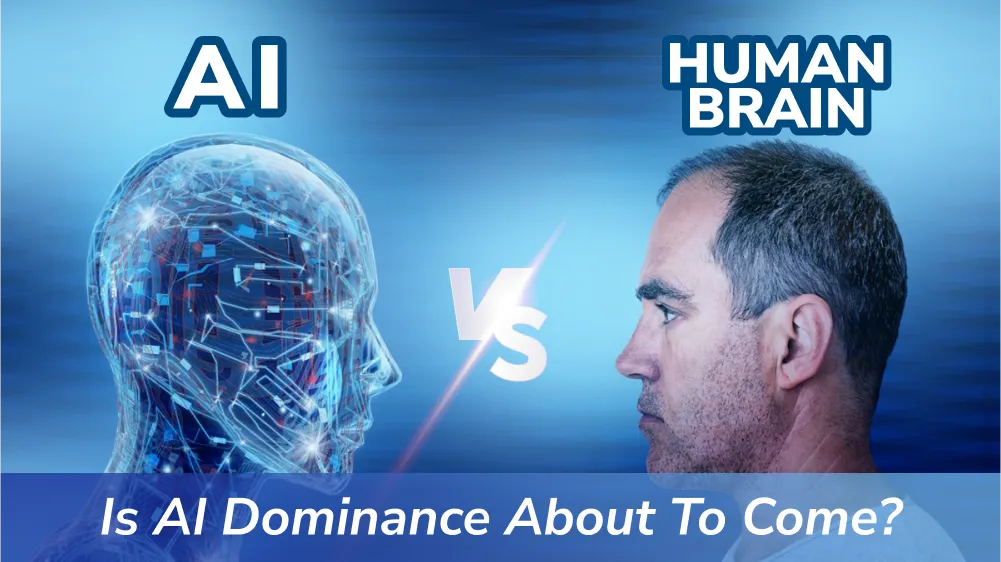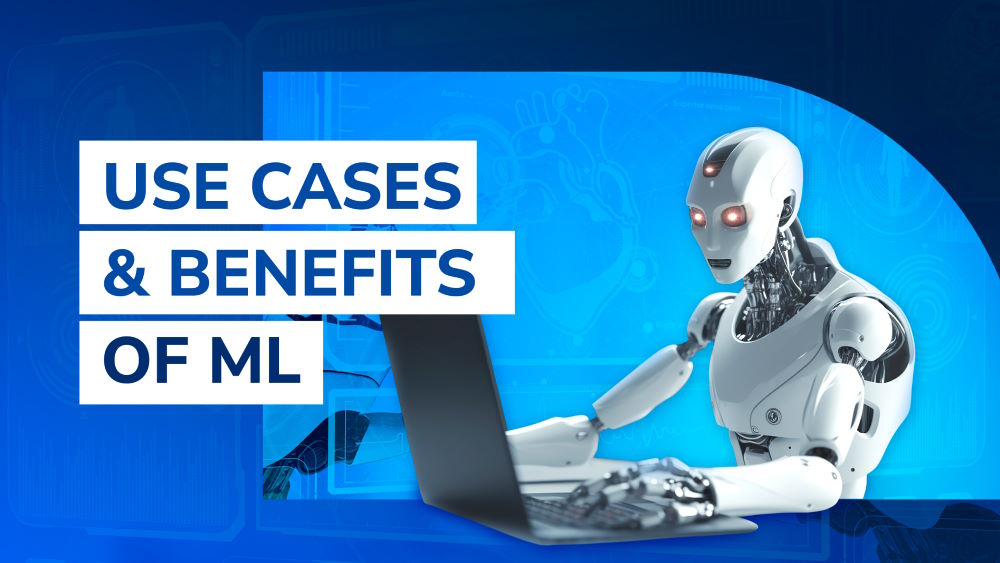
AI vs. Human Brain: Is AI Dominance About to Come?
The debate between AI vs. human brains has long been an endless topic in society. Human intelligence currently surpasses AI, but will it last?


As the business world is becoming more and more digitized, the use of machine learning is growing in popularity. Machine learning can be used for a variety of tasks, such as predicting customer behavior, optimizing marketing campaigns, detecting fraud, etc. We are going to explore some common uses and benefits of machine learning for business in this article. By understanding how machine learning can be applied to various business tasks, you will be better equipped to take advantage of this powerful technology.
In definition, machine learning (ML) is a term for artificial intelligence (AI) that relies on using data to learn and improve from experience. In data science, the fundamental concept behind machine learning systems is to give computers the ability to learn without being explicitly programmed or intervened by humans. This is done through a process of repeatedly exposing the computer to historical data and allowing it to learn on its own.
There are multi types of machine learning algorithms, which all perform differently depending on the type of data they are exposed to. Some common types of ML algorithms include supervised learning, unsupervised learning, semi-supervised learning, and reinforcement learning.
This is a type of machine learning algorithm that is used to make predictions or forecasts. It aims to learn from a set of training data, which is used to predict the output for new data. This type of algorithm is typically used for classification problems, such as indicating whether an email is spam or not or predicting whether a customer is likely to churn.
Unsupervised learning is a machine learning algorithm used to find patterns and relationships in data without any prior knowledge of what the data should look like. Unsupervised learning algorithms are typically used for clustering problems, such as grouping customers together based on their purchase behavior.
Semi-supervised learning is another type of machine learning algorithm that is a combination of supervised and unsupervised learning. Semi-supervised learning algorithms are used to improve the accuracy of predictions made by supervised learning algorithms by using some unlabeled data to help train the model.
Reinforcement learning is used to learn how to take actions in order to achieve the desired goal. Reinforcement learning algorithms are typically used for decision-making problems, such as choosing the best action to take in a particular situation.
The critical strength of machine learning is that it can be applied to a wide variety of problems and can be used to improve the performance of many different types of systems. In addition, machine learning algorithms are constantly evolving and becoming more sophisticated, which means that the potential machine learning applications are endless.
Machine learning can help improve natural language processing (NLP) for businesses. Specifically, it is used for text analysis applications, such as sentiment analysis and topic detection. For example, sentiment analysis is used to determine the attitude of a text, such as whether it is positive, negative, or neutral. Topic detection is used to find the main topics in a text. Therefore, businesses can utilize text analysis applications for a variety of purposes like market research, customer service, chatbots, and marketing. Chatbots are especially useful because they can be trained to understand natural language and respond in real-time. They can also help with customer support by automatically responding to customer inquiries. Marketing can also benefit from machine learning algorithms that can improve the accuracy of targeted ads.
Machine learning can also be used for speech recognition applications. This includes things like voice commands and dictation. Voice commands are becoming increasingly popular with the advent of virtual assistants like Siri and Google Now. Dictation is also becoming more common as more people use their smartphones and tablets to take notes. Speech recognition applications can also be used in healthcare to help patients with disabilities communicate with doctors.
This is one of the top machine learning applications. ML can be used for fraud detection purposes, such as credit card fraud and insurance fraud. Credit card fraud is a critical problem for businesses, and machine learning can be used to detect fraudulent transactions. Insurance fraud is also a major problem, and machine learning can be used to identify patterns in fraudulent claims. Fraud detection applications can also be used for other purposes like security and anti-spam.
One popular application of machine learning is in DevOps. MLOps, or machine learning DevOps, is the use of machine learning algorithms to optimize and automate the software development process. Using machine learning, DevOps teams can speed up the development process by automating code validation and error correction tasks. In addition, machine learning can be used to predict future problems and issues that may occur in the software development process. This allows DevOps teams to address potential problems before they become actual problems.
Machine learning can be used for predictive analytics applications, such as predicting customer behavior and predicting stock prices. Predictive analytics can be used to improve business decisions by forecasting future trends. It can also be used to improve marketing campaigns by predicting which ads are most likely to be successful. Predictive analytics can also be used for financial planning and risk management.
Machine learning can also be used for image recognition and classification. This includes things like facial recognition and objects recognition. Facial recognition is used to identify people in images or videos. Object recognition is used to identify the objects. Image recognition and classification applications can be used for a variety of purposes like security purposes (such as identifying criminals in surveillance footage), marketing, and research (such as identifying the types of products that are most popular).
Machine learning can be used for customer segmentation purposes. This includes things like identifying the types of customers that are most likely to buy a product. Customer segmentation is important to improve marketing campaigns by targeting specific types of customers. It can also be used to enhance customer service by providing customized support for different types of customers. With machine learning technology, customer segmentation will be a big help for product development purposes, such as identifying which features are most popular with different types of customers and developing just what potential customers need.
Data mining is another common business machine learning application. This is the process of finding patterns in data. Data mining can be used to find trends and insights that can help improve business decisions. It can also be used to do market research, find new customers, and understand customer behavior. Data mining is a valuable tool for businesses, and it can be improved with machine learning technology.
Autonomous vehicles have a lot of potential for businesses; however, the development process is complex and costly. With machine learning technology, businesses can develop autonomous vehicles faster and more efficiently. Machine learning will help to optimize the algorithms that control vehicles as well as improve accuracy and stability.
Machine learning is a rapidly growing field with endless potential applications for businesses. Here are ten key benefits of machine learning that companies should keep in mind:
As mentioned, machine learning can help businesses automate the generation of insights from raw data. By identifying hidden patterns and trends, machine learning can help businesses make better decisions and predictions.
Machine learning can help businesses improve their decision-making processes by providing them with automated recommendations and forecasts.
Machine learning can help businesses deliver better customer service by automatically responding to customer queries and complaints.
Machine learning can help businesses improve their product design by providing them with feedback about user preferences and behavior.
Machine learning can help businesses optimize their operations by automatically adjusting their processes based on real-time data.
Machine learning can help businesses save money and resources by automating tasks such as marketing, customer service, and production.
Machine learning can help businesses improve their security posture by identifying and responding to security threats in real-time.
Machine learning can help businesses boost their productivity by automating tasks such as scheduling and data entry.
Machine learning can help businesses accelerate their innovation process by providing them with insights into customer behavior and preferences.
Machine learning can help businesses stay competitive by providing them with an edge over their competitors.
These are a few of the many benefits that businesses can reap from using machine learning. With the ever-growing popularity of machine learning, it is sure to play a significant role in the business world in the future.

As you can see, the business world is starting to catch on to the power of machine learning. For good reasons – machine learning can offer businesses a wealth of benefits that can help them improve their operations, save money, stay competitive, etc. By learning about the common use cases and benefits of machine learning in business, you will better understand this technology and decide how it can fit into the bigger picture of your business.
The debate between AI vs. human brains has long been an endless topic in society. Human intelligence currently surpasses AI, but will it last?
Are you seeking the ideal programming language for your AI project? Explore this curated list of the top ten languages and their corresponding frameworks.
If you want to know how to become an AI prompt engineer, know that you need more than technical expertise to succeed in this emerging field.
The race to dominate AI space and be the first to develop breakthrough AI technology presents companies with many challenges, which are outlined in this.
Find out what AI code generation is, the best tools, and what to consider when choosing a software development team in a post-AI-driven world.



